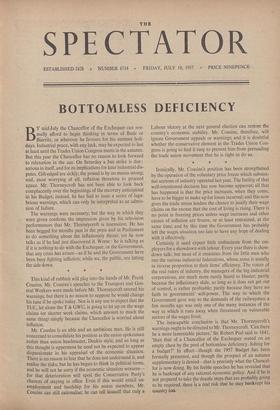BOTTOMLESS DEFICIENCY
BY mid-July the Chancellor of the Exchequer can nor- mally afford to begin thinking in terms of Bude or Biarritz, or wherever he favours for his summer holi- days, Industrial peace, with any luck, may be expected to last at least until the Trades Union Congress meets in the autumn. But this year the Chancellor has no reason to look forward to relaxation in the sun. On Saturday a bus strike is due : serious in itself, and for its implications for later industrial dis- putes. Gilt-edged are sickly; the pound is by no means strong; and, most worrying of all, inflation threatens to proceed apace. Mr. Thorneycroft has not ' been able to look back complacently over the beginnings of the recovery anticipated in his Budget; instead, he has had to issue a series of lugu- brious warnings, which can only be interpreted as an admis- sion of failure.
The warnings were necessary; but the way in which they were given confirms the impression given by his television performances that Mr. Thorneycroft is insensitive. He has been begged for months past in the press arid in Parliament to do something about the inflationary threat; yet he now talks as if he had just discovered it. Worse : he is talking as if it is nothing.to do with the Exchequer, or the Government, that any crisis has arisen—as if he and the Government have been busy fighting inflation; while we, the public, are letting the side down.
This kind of rubbish will play into the hands of Mr. Frank Cousins. Mr. Cousins's speeches to the Transport and Gen- eral Workers were made before Mr. Thorneycroft uttered his warnings; but there is no reason to suppose he would change his tune if he spoke today. Nor is it any use to expect that the TUC, let alone the T & GWU, is going to let up on the wage claims (or shorter week claims, which amount to much the same thing) simply because the Chancellor is worried about inflation.
Mr. Cousins is an able and an ambitious man. He is still concerned to consolidate his position as the union spokesman rather than union headmaster, Deakin style; and so long as this thought is uppermost he need not be expected to appear dispassionate in his appraisal of the economic situation. There is no reason to fear that he does not understand it, and realise the risks; but he has begun to think in political terms, and he will not be sorry if the economic situation worsens— for that deterioration will spoil the Conservative Party's chances of staying in office. Even if this would entail un- employment and hardship for his union members, Mr. Cousins can still rationalise; he can tell himself that only a Labour victory at the next general election can restore the country's economic stability. Mr. Cousins, therefore, will ignore Government appeals or warnings; and it is doubtful whether the conservative element in the Trades Union Con- gress is going to find it easy to prevent him from persuading the trade union movement that he is right to do so.
*
Ironically, Mr. Cousins's position has been strengthened by the operation of the voluntary price freeze which substan- tial sections of industry operated last year. The futility of that well-intentioned decision has now become apparent; all that has happened is that the price increases, when they come, have to be bigger to make up for losses incurred; and this now gives the trade union leaders the chance to justify their wage claims on the excuse that the cost of living is rising. There is no point in freezing prices unless wage increases and other causes of inflation are frozen, or at least restrained, at the same time; and by this time the Government has probably left the wages situation too late to have any hope of dealing with it effectively.
Certainly it need expect little enthusiasm from the em- ployers for a showdown with labour. Every year there is show- down talk; but most of it emanates from the little men who run the various industrial federations, whose noise is usually in inverse proportion to their firms' efficiency. The voices of the real rulers of industry, the managers of the big industrial corporations, are much more rarely heard to bluster; partly because the inflationary slide, so long as it does not get out of control, is rather profitable; partly because they have no faith in governments' will-power. The way in which the Government gave way to the demands of the railwaymen a few months ago was only one of the many instances of the way in which it runs away when threatened on vulnerable sectors of the wages front.
The inescapable conclusion is that Mr. Thorneycroft's warnings ought to be directed to Mr. Thorneycroft. 'Can there be a more lamentable picture,' Sir Robert Peel said in 1841, `than that of a Chancellor of the Exchequer seated on an empty chest by the pool of bottomless deficiency, fishing for a budget?' In effect—though the 1957 Budget has been formally presented, and though the prospect of an autumn supplementary is denied—that is precisely what the Chancel- lor is now doing. By his feeble speeches he has revealed that he is bankrupt of any rational economic policy. And if he is not prepared to take the drastic steps that are probably going to be required, there is a real risk that he may bankrupt his country too.














































 Previous page
Previous page